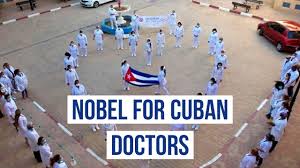 Comrade Owei Lakemfa.
Comrade Owei Lakemfa.
By Owei Lakemfa.
THE British cruise ship, MS Braemer with 682 passengers from ten countries was in March 2020 virtually adrift in the Caribbean with no destination habour and no port willing to allow it dock because the coronavirus COVID-19 was raging in it. Three countries had refused to allow it berth and apparently, no country was willing to come to its rescue. This was understandable because the highly contagious virus has neither a cure nor vaccine and the ship carried five confirmed cases with 55 passengers and crew members who had exhibited coronavirus-like symptoms, in isolation.

It was at that point of desperation, tiny Cuba despite the enormous risks to its population, stepped in to invite the ship dock at its Mariel Port, transferred the passengers and crew in bus convoys to Havana and got them flown to Britain. This was merely one of the many steps Cuba and its medical personnel have taken to fight the monstrous virus, not just within their borders, but across the world.
While almost all countries in the world shut their borders, maximised their medical personnel and self-isolated in order to fight the seemingly unconquerable march of the virus, Cuba mobilised over 3,700 of its healthcare professionals with 61.2 per-cent of them being women, and sent them abroad to fight the virus. These were grouped into 47 teams and sent to 46 countries. In their first five months, the Cubans treated 355,785 people, saving 9,736 lives.
These medical teams are part of the Henry Reeve International Medical Brigade, a movement established on September 19, 2005 with the mission: “To provide humanitarian and medical assistance to the population of countries hit by natural disasters and epidemics, and contribute to their recovery.” This is in furtherance of Cuba’s belief that health is a fundamental human right to which all human beings are entitled and that the well-being of one person determines that of others. Within the present context, no part of the world can be safe if a part is ravaged by the virus. So in fighting COVID-19 under distant skies, the Cuban white coats are also defending their populace against the virus.
The medical brigade is named in honour of Henry Reeve, a young American from Brooklyn, New York, who on May 4, 1869 arrived on the shores of Cuba to participate in the independence war against Spanish colonialism. He died at 26. In 2020 when Italy became the epicentre of the virus rage, Cuba sent two of these medical brigades made up of 90 medical personnel to Lombardy and Piedmont, then regarded as the worst affected places on earth. It also sent 39 health workers to the European Principality of Andorra, and 115 to Azerbaijan, providing services to more than 16,000 people.
In the Middle East, it sent 229 white coats to Qatar and 298 to Kuwait to battle COVID-19. It has also sent a brigade to the United Arab Emirates, UAE. In Latin America, it despatched 116 health professionals to Honduras, Nicaragua, Venezuela and Peru, who treated over 80,000 patients. It also provided technical assistance to Mexico. Its largest anti-COVID medical contingent of 650 was sent to a dozen Caribbean countries; Antigua and Barbuda, Saint Lucia, Saint Vincent and the Grenadines, Suriname, Jamaica, Grenada, Haiti, Belize, Dominica, Barbados, and Trinidad and Tobago, where it has treated about 33,000 people. This contingent included fifteen medical professionals sent to Martinique, the original home of one of the greatest Africans, the medical doctor, Franz Fanon, author of famous books like ‘Black Skin, White Masks’ and ‘The Wretched of the Earth.’
Africa comes next with 641 Cuban medical personnel sent to combat COVID-19 in Angola, Togo, Cape Verde, South Africa, Guinea Conakry, Guinea Bissau, São Tomé and Príncipe, Equatorial Guinea, Sierra Leone and Kenya. The 10 Cuban medical brigades have delivered care to over 38,000 persons in those countries. Six years ago when Ebola broke out in Africa, 256 Cuban doctors and nurses of the Reeve International Medical Brigade flew to the continent to battle the highly contagious epidemic. They worked in Sierra Leone, Liberia and Guinea, treating over 2,000 patients. Two of these Cuban internationalists lost their lives to malaria, but another, Dr. Felix Baez who contracted Ebola, survived, and returned to Africa to continue the fight. Ebola was defeated in the West African region and pushed towards extinction in the rest of the continent.
The first international assignment of the Medical Brigade was in October, 2005 when floods swept through Guatemala. It sent 688 Cuban healthcare professionals who treated over 477,000 people and saved more than 1,300 lives. It assisted in other flood disaster situations like in Bolivia, Belize, Mexico, El Salvador, Chile, Western Sahara (refugees camps in Tindouf, Algeria, Peru and Sierra Leone). When an earthquake struck Pakistan in October 2005 with 70,000 loss of lives, 100,000 injured and three million rendered homeless, some 2,000 Cuban healthcare workers flew in to treat more than 1,700,000 patients. That mission alone performed over 14,000 surgeries and more than 166,000 survivors received specialized rehabilitation services while over 2,000 lives were saved.
Another heroic war fought by the Reeve International Medical Brigade was in 2010 when Cuban doctors and nurses flew to combat a cholera epidemic in Haiti. It treated 400,000 people and saved about 76,000 lives. In its fifteen-year existence, the Henry Reeve International Medical Brigade has constituted 71 medical brigades with over 9,000 Cuban healthcare professionals caring for approximately four million people and saving more than 89,000 lives. Within this period, it has assisted in combating the COVID-19 pandemic, Ebola and cholera epidemics and natural disasters including floods, earthquakes and hurricanes.
On May 26, 2017, at the 70th World Health Assembly, the World Health Organisation, WHO, awarded the Dr. LEE Jong-wook Memorial Prize for Public Health to the Henry Reeve International Medical Brigade in recognition for its universal services.
Given these records, the Medical Brigade’s promotion of human solidarity and universal peace, the Nobel Peace Prize being for the person who in the preceding year “shall have done the most or the best work for fraternity…” and, 2020 being largely marked by COVID-19, it is logical for the Nobel Peace Prize to be awarded to an organisation like the Henry Reeve International Medical Brigade for making extraordinary contributions towards overcoming the pandemic.
The path of this medical movement to the peace prize seems smoothened by the precedence of the International Committee of the Red Cross which as an organisation has been awarded the Nobel Peace Prize a total three times: 1917, during the carnage of the First World War, 1944 as the more tragic Second World War dragged to an end, and at the height of the Cold War in 1963. I rest my case.




GIPHY App Key not set. Please check settings